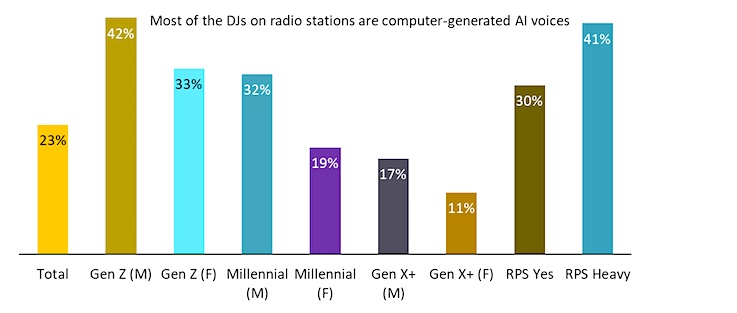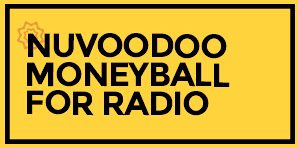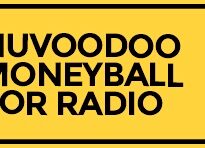Moneyball: How Listeners Feel About AI (Send in the Clones)


In the data below from NuVoodoo Ratings Study 24, fielded last month, and including responses from 3,188 people ages 14 to 64 nationwide, over a fifth agree that most of the DJs on radio stations are computer-generated AI voices. The percentage climbs to 42% among Gen Z males (ages 14-27) and droops to 11% among the women in our sample belonging to Gen X and the young end of the Baby Boom (ages 44-64, labeled “Gen X+”). Critically, however, the suspicions are 30% among those most likely to participate in ratings methodology (labeled “RPS Yes”) and even higher among the subset of that group who both show a proclivity to participate in ratings methodology AND listen to radio at least an hour a day (labeled “RPS Heavy”). With their hefty daily TSL, those RPS Heavies are the ones who can make or break your next book, so we pay close attention to how they perceive changes in the business.


We also asked listeners to imagine how they’d feel if the host of their music radio show was (i) live, (ii) piped-in from another market, (iii) time-shifted, or (iv) non-human (AI). The results show that only a small 5% sliver feels bad with a live, in-market, in-studio host (presumably because they’d prefer no host, no talking at all). That leaves 95% who feel good or at least not negative about live, in-market, in-studio hosted shows.


In 2024, however, every other option comes at a possible price if listeners are aware. 65% are either happy or non-plussed about time-shifted hosting, but that leaves about a third unhappy (with this very common practice). Bringing in voices from outside the market leaves 42% unhappy (with this also common practice). And nearly half – 48% – are displeased with the notion of a non-human AI host. Some will note that those who say they feel good about these non-traditional hosting arrangements grows from the 20% observed for time-shifted and outside-the-market hosting up to 22% for AI, presumably due to novelty of this new technology.
Feelings aside, what if we just ask listeners what they’d do if they found out a station they listened to was using AI voices? A majority of the most valuable listeners – those among the small group labeled “RPS Heavy” (heavy listeners showing a strong likelihood of participation in ratings methodology) – would listen more or at least not change their listening at all. But fully 43% say they’d listen less or tune away and never come back.


Few listeners suspect the degree to which music hosts are time-shifted and/or out-of-market. How would listeners become aware of an AI host with the tremendous capabilities of companies offering AI solutions? The savings are tempting given radio’s reality in 2024. AI may be the only way forward for some operators. Many listeners will never know. There are certainly great applications for AI or cloned voices taking over boring or repetitive chores. It’s plausible that employing AI in lower-usage dayparts would allow talent upgrades in critical dayparts.
With the walls around radio’s former walled garden having been torn down by wireless technology and the continuing changes to vehicle infotainment systems, operators need every advantage possible to make the presentations on their stations great. Spotify and its rivals play music that’s at least as enjoyable for a listener as a radio playlist designed for hundreds or thousands of people. It’s critical that humanity plays a distinctive role for music radio, propelling the form beyond the playlist alone – as it does on many stations and should be doing on many more. Fore more details, please reach out to Leigh Jacobs at Leigh@nuvoodoo.com.




